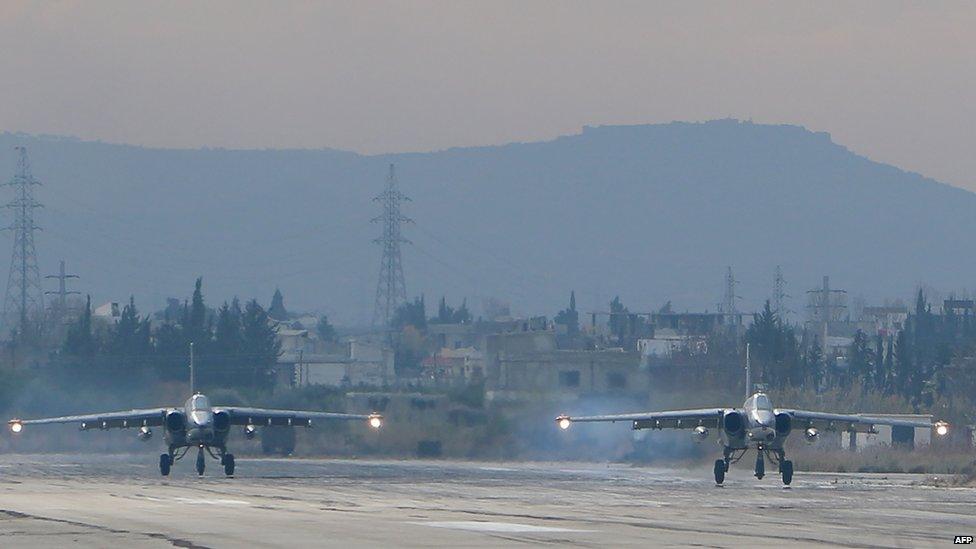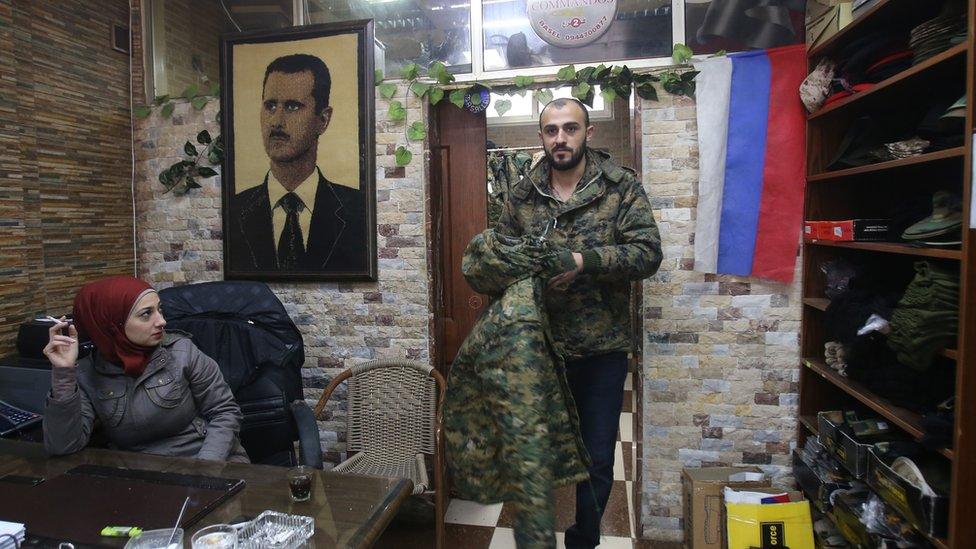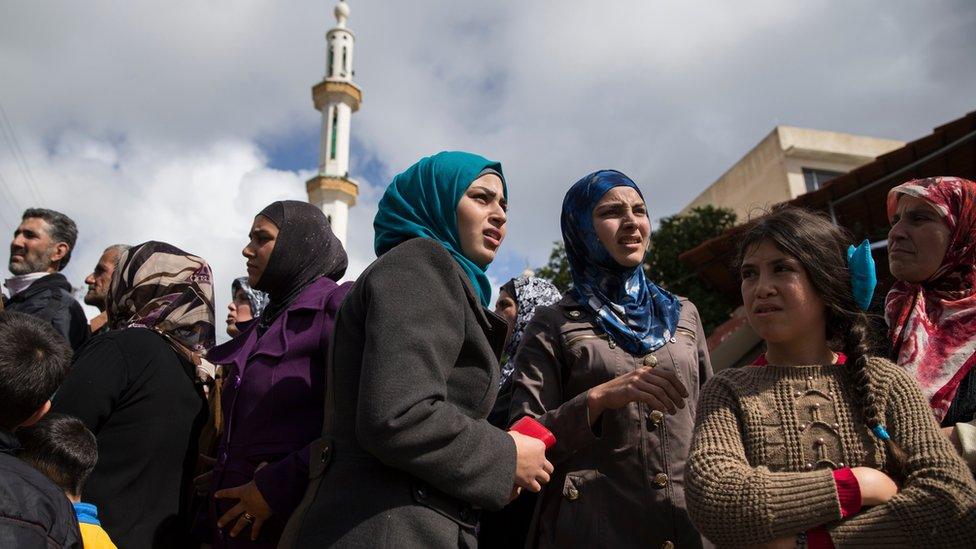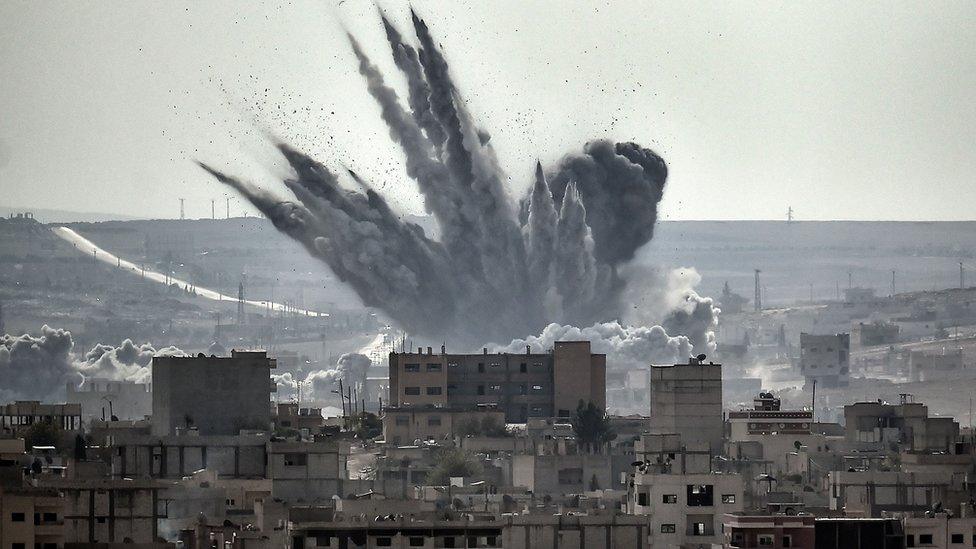PJ Crowley: Putin's payoff in Syria
- Published

Russian Su-25 bombers have been conducting air raids in support of Syrian government forces
Vladimir Putin's surprise announcement of a Russian military pullback from Syria underscores how his country has played a decisive role in the conflict, frequently outmanoeuvring the US, writes PJ Crowley.
There are no winning hands in the great game being played in Syria, but Vladimir Putin has reaped a positive return from his military intervention to shore up the position of President Bashar al-Assad's government.
His gamble could still be a loser over the long term, but he currently has command of the table and over what happens next.
Mr Putin's combination of aggression and finesse is in sharp contrast to his American counterpart. Barack Obama has carefully guarded his chips, seeing little to be gained with the lousy cards in Syria.
While the United States is leading a limited military campaign against the Islamic State, Mr Obama has offered little more than the status quo ante when it comes to Mr Assad.

More on the Syria conflict

Mr Obama has called for Mr Assad to step down, but there has never been a real strategy behind that rhetoric. Mr Putin and Mr Obama are actually playing two interrelated but different games. Success in each game is the same - a functioning Syrian state that is not a safe haven for extremists.
Their paths are vastly different. One envisages the survival of the existing Syrian regime, with some symbolic accommodation with its political opposition. The other one involves an inclusive political process that results in genuine power-sharing.

Mr Putin's intervention strengthened the traditional alliance between Moscow and Damascus
Given the events of the past six months, Mr Putin is far closer to his goal than Mr Obama. Mr Obama insists that Syria does not represent a competition between the two leaders, but it is becoming increasingly hard to view it any other way.
While Mr Obama is fond of calling the United States the indispensable nation, it is President Putin who has repeatedly made himself indispensable in Syria.
First, after what he viewed as a fiasco in Libya, he made sure that the United Nations would not sanction a comparable intervention in Syria. There has been no international responsibility to protect the Syrian people from their dictator as there was in Libya.
Second, after Mr Obama threatened military action in response to Syria's crossing of his red line over the use of chemical weapons, Mr Putin imposed on Mr Assad to yield his chemical weapons stocks. However, this provided a de facto green light to attack the opposition through conventional means.
Finally, while Mr Obama hesitated at the use of military force, requesting congressional approval that would likely not have materialised, Mr Putin intervened decisively.

The conflict has left much of Syria's population dependent on humanitarian aid
Where Mr Obama's contemplated use of military force would not have affected the military balance in the Syrian civil war, Mr Putin fundamentally changed at least one crucial fact on the ground.
Mr Obama's policy has been based until now on the presumption that Mr Assad's days are numbered. That may still be true but, thanks to Putin, the number is getting larger not smaller.
Mr Obama is right when he said that Syria cannot return to where it was before the civil war. He is also right when he says that the conflict will not end as long as Mr Assad remains in power.
But given that Mr Assad for the moment is not going anywhere, it is very likely that the political process that resumes this week in Syria is not going anywhere either.
As Mr Obama suggested in a recent interview, external with Jeffrey Goldberg of The Atlantic, he does not see Mr Putin's intervention as a success, but rather as an over-extension.
Washington was content to play Huck Finn and let Moscow be Tom Sawyer and paint the fence.
The problem with the White House analogy is that in regional geo-politics, who actually paints the fence matters. Mr Obama over the past three years has been far too dismissive of the importance of the perceived decline in the credibility of American power.

The US intervention in Syria has been restricted to special forces raids and limited aerial bombardment in support of local allies
Mr Obama suggests he wants to leave a "clean barn" for his successor. In fact, his successor will need to rebuild international trust and confidence in American leadership just as he did - albeit from a very different place.
In 2009, the United States was accused of doing too much, with dire consequences in Iraq. Today, the United States is accused of not doing enough, with dire consequences in Syria.
While Mr Obama has never believed that he needed to solve the tragedy in Syria - he has consistently viewed it as someone else's civil war - in all likelihood his successor will have to do more.
US efforts to date have degraded the Islamic State, but it is questionable whether it can be defeated through the existing limited levels of air power and special operations forces.
Mr Obama has been reluctant to do more, understandably fearing that greater involvement might exacerbate the extremist threat to the US and its allies.
While the current operational pause has had a greater effect on the ground than anticipated, the next president will likely inherit the Syrian civil war and find a solution to end it.
Its dangerous ripple effects cannot be ignored, even if the conflict itself does not represent an existential threat.
What is unclear is whether Mr Putin's gamble has made a solution to the Syrian conflict harder or easier to achieve. It could be either one.
PJ Crowley is a former US Assistant Secretary of State, now a professor of practice and fellow at the George Washington University Institute of Public Diplomacy & Global Communication.